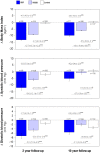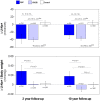Gastric bypass surgery is followed by lowered blood pressure and increased diuresis - long term results from the Swedish Obese Subjects (SOS) study
- PMID: 23209592
- PMCID: PMC3510228
- DOI: 10.1371/journal.pone.0049696
Gastric bypass surgery is followed by lowered blood pressure and increased diuresis - long term results from the Swedish Obese Subjects (SOS) study
Erratum in
- PLoS One. 2013;8(5). doi: 10.1371/annotation/88dbb5b7-3f7e-4b26-a5b6-f020d33f0182 doi: 10.1371/annotation/88dbb5b7-3f7e-4b26-a5b6-f020d33f0182
Abstract
Objective: To compare two bariatric surgical principles with regard to effects on blood pressure and salt intake.
Background: In most patients bariatric surgery induces a sustained weight loss and a reduced cardiovascular risk profile but the long-term effect on blood pressure is uncertain.
Methods: Cohort study with data from the prospective, controlled Swedish Obese Subjects (SOS) study involving 480 primary health care centres and 25 surgical departments in Sweden. Obese patients treated with non-surgical methods (Controls, n = 1636 and n = 1132 at 2 y and 10 y follow up, respectively) were compared to patients treated with gastric bypass (GBP, n = 245 and n = 277, respectively) or purely restrictive procedures (vertical banded gastroplasty or gastric banding; VBG/B, n = 1534 and n = 1064, respectively).
Results: At long-term follow-up (median 10 y) GBP was associated with lowered systolic (mean: -5.1 mm Hg) and diastolic pressure (-5.6 mmHg) differing significantly from both VBG/B (-1.5 and -2.1 mmHg, respectively; p<0.001) and Controls (+1.2 and -3.8 mmHg, respectively; p<0.01). Diurnal urinary output was +100 ml (P<0.05) and +170 ml (P<0.001) higher in GBP subjects than in weight-loss matched VBG/B subjects at the 2 y and 10 y follow-ups, respectively. Urinary output was linearly associated with blood pressure only after GBP and these patients consumed approximately 1 g salt per day more at the follow-ups than did VBG/B (P<0.01).
Conclusions: The purely restrictive techniques VBG/B exerted a transient blood pressure lowering effect, whereas gastric bypass was associated with a sustained blood pressure reduction and an increased diuresis. The daily salt consumption was higher after gastric bypass than after restrictive bariatric surgery.
Conflict of interest statement
Figures



References
-
- Kelly T, Yang W, Chen CS, et al. (2008) Global burden of obesity in 2005 and projections to 2030. Int J Obes (Lond) 32 (9) 1431–7. - PubMed
-
- Wang Y, Beydoun MA, Liang L, et al. (2008) Will all Americans become overweight or obese? estimating the progression and cost of the US obesity epidemic. Obesity (Silver Spring) 16 (10) 2323–30. - PubMed
-
- Colquitt JL, Picot J, Loveman E, Clegg AJ (2009) Surgery for obesity. Cochrane Database Syst Rev 2009 (2) CD003641. - PubMed
-
- Sjostrom L, Lindroos AK, Peltonen M, et al. (2004) Lifestyle, diabetes, and cardiovascular risk factors 10 years after bariatric surgery. N Engl J Med 351 (26) 2683–93. - PubMed
-
- Heneghan HM, Meron-Eldar S, Brethauer SA, et al. (2011) Effect of bariatric surgery on cardiovascular risk profile. Am J Cardiol 108 (10) 1499–507. - PubMed
Publication types
MeSH terms
Substances
LinkOut - more resources
Full Text Sources
Medical
Research Materials

